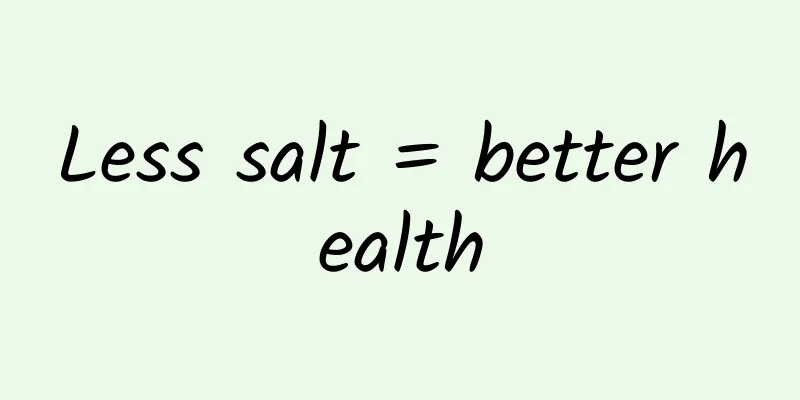Less salt = better health

|
In order to prevent and control high blood pressure, the World Health Organization and dietary guidelines of various countries all advocate a low-salt diet, and recommend that healthy adults should not consume more than 5 grams of salt per day. Now, many people also strictly follow a low-salt diet in their daily lives. So, is it really better to eat less salt? Is a low-salt diet suitable for everyone? Let's talk about this question today. First, a low-salt diet does have benefits, but it is not suitable for everyone. Do we really understand the low-salt diet completely? Is there no problem as long as the daily salt intake is less than 5 grams? The answer is obviously not that simple. For example, some patients with low blood pressure. I have seen patients who often feel tired, dizzy, and nauseous. The examination did not find any problems, except that their blood pressure was a little low. As long as they consume a little more salt, the symptoms can be relieved. There are also some people who cannot adopt a low-salt diet and need to consume more salt than the recommended amount, such as children and adolescents who exercise a lot. I saw a patient, a boy who had just finished the college entrance examination, who said that he often felt dizzy recently. His family was worried that there might be something wrong with his heart, because he had undergone ablation surgery for tachycardia before and was worried about a recurrence. I combined the interview and examination and found that the boy recovered well after the surgery and had no heart problems. So why did he often feel dizzy? After careful interview, I learned that he loved playing basketball and played basketball for 2 hours almost every afternoon. Like this boy, if he exercises vigorously in high temperatures, moves a lot and sweats a lot, he will easily get heatstroke and feel dizzy if he does not replenish salt in time to maintain electrolyte balance. Therefore, people who often exercise or work in high temperatures need to consume more salt to avoid heat stroke. Secondly, not everyone needs to adopt a low-salt diet to prevent high blood pressure. Although studies have shown that increasing salt intake can cause blood pressure to rise, the extent of the increase in blood pressure varies from person to person, as different people have different sensitivities to salt. When consuming the same amount of salt, some people's blood pressure only rises a little, while others' blood pressure rises much higher. People whose blood pressure rises after consuming salt are medically called "salt-sensitive people" and need to strictly control their salt intake. The principle may be that it is difficult for "salt-sensitive people" to excrete excess salt from urine, and the excess salt absorbs water into the blood, increasing blood volume and causing blood pressure to rise. The detection rate of "salt-sensitive people" varies by region and race. Chinese people not only eat a lot of salt, but are also very sensitive to salt. "Salt-sensitive people" account for 20% to 40% of my country, and as high as 60% of patients with primary hypertension. "Salt-sensitive people" also account for a large proportion of the elderly, obese people, diabetics, and patients with metabolic syndrome. Postmenopausal women will also be more sensitive to salt. If you are not "salt sensitive", you don't need to deliberately stick to a low-salt diet. Of course, you can't eat too much salt, after all, "too much salt means loss"! Eating too little salt can also be a problem. Many people only know that they should eat a low-salt diet, but they don’t know that the lower the better. I once treated a grandmother who had coronary heart disease. She also had high blood pressure, and the doctor repeatedly told her to stick to a low-salt diet. She also paid special attention to her diet, not ordering takeout, not going to restaurants, and cooking very light dishes every day, with almost no salt. My mother-in-law could tolerate these eating habits, but her husband was in trouble. He followed the same eating habits, and after a long time, he complained of dizziness, nausea, and fatigue every day. The old couple came to see the doctor together, and they argued in front of me, neither of them giving in. One complained that the other was "abusing" and the other said that the other was "acting weird." In fact, the old man was not "acting weird". He suffered from hyponatremia, which manifested as dizziness, nausea, fatigue, loss of appetite, etc. Salt is decomposed into sodium ions and chloride ions in the human body, which play different roles. In particular, sodium ions are essential for the body to maintain fluid balance, transport oxygen and nutrients, and maintain the electrical impulses of nerve cells. Therefore, we must consume a certain amount of salt every day to maintain the balance of sodium in the body. Warm reminder: my country is one of the countries with the highest salt intake in the world. Long-term high-salt diet is harmful to the body. It is necessary for ordinary people to control the amount of salt in their daily lives. But salt is not a scourge. Sodium is one of the essential nutrients for the human body. A balanced diet is important. No matter what you eat, it is best to eat in moderation. Eating too much or too little is not good, including salt. |
<<: National Malaria Day: Refuse to be infected with malaria. Remember these facts
>>: World Immunization Week丨Why do we need to get vaccinated?
Recommend
Can I have induced labor after a caesarean section?
I believe that many female friends prefer natural...
How to treat delayed menstruation?
Menstruation is a must for normal adult women eve...
How long does it take to complete the abortion surgery?
Abortion refers to the termination of pregnancy t...
One dark and one blurry test paper
We should have some basic knowledge about early p...
Why does menstruation last for a long time?
The normal menstrual cycle of women is about four...
44-year-old suddenly stopped menstruating
Menstruation is a normal physiological manifestat...
What to do if your mother suffers from depression
According to relevant statistics, 15 out of every...
Abnormal leucorrhea and back pain, what's going on?
When women have abnormal leucorrhea, they should ...
First month of pregnancy false menstruation
We all know that absent menstruation is an import...
Symptoms of 33 weeks pregnancy
At the 33rd week of pregnancy, which is the eight...
What should you pay attention to when you are five and a half months pregnant?
Women should be careful not to make random choice...
What are the characteristics of sesame oil flavor? Nutritional components of sesame oil
Sesame, also known as sesame and sesame, is a see...
How to self-check breast disease?
Breast health has become an issue that women have...









